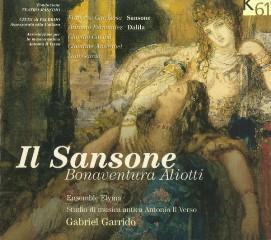Bonaventura Aliotti - Il Sansone (2001)
Bonaventura Aliotti - Il Sansone (2001)

1 Sinfonia 1:50 2 Prima Parte Scena 1 - Coro - Sansone: Speranze Gioite 8:47 3 Prima Parte Scena 2 - Capitano Dei Filistei: Dove, Petti Avviliti 3:14 4 Prima Parte Scena 3 - Capitano - Dalila: Al Filisteo Coraggio 6:14 5 Prima Parte Scena 4 - Inganno: Vanne Pur 4:12 6 Secunda Parte - Scena 5 - Sansone: Ozioso Valor 1:44 7 Secunda Parte - Scena 6 - Dalila - Sansone: Pietà 6:34 8 Secunda Parte - Scena 7 - Inganno - Morfeo: Si Dalila Ardita 9:33 9 Secunda Parte - Scena 8 - Dalila - Sansone: Ahi Sanson 16:29 10 Secunda Parte - Scena 9 - Dalila - Inganno - Morfeo: Chuise I Lumi 3:41 11 Secunda Parte - Scena 10 - Dalila - Sansone - Inganno - Morfeo: Sansone All'armi 1:43 12 Epilogo - Coro - Capitano - Sansone: Il Marte In Battaglia 3:45 Bass Vocals [Morfeo] – Ivan García Bassoon – François De Roubaix Cello, Viola da Gamba – Sabina Colonna Preti Choir – Ensemble Vocale Dello Studio Di Musica Antica Antonio Il Verso Countertenor Vocals [Il Capitano dei Filistei] – Claudio Cavina Dulcian – François De Rudder Harp – Loredana Gintoli Harpsichord – Basilio Timpanaro Organ – Loredana Gintoli Soprano Vocals [Dalila] – Adriana Fernández Soprano Vocals [Inganno] – Claudine Ansermet Tenor Vocals [Sansone] – Francesc Garrigosa Theorbo – Ugo Di Giovanni Viola – Martín Barrera, Rodney Prada Viola da Gamba – Mariko Abe Violin – Olivia Centurioni, Pablo Valetti Violone – Andrea De Carlo Ensemble – Ensemble Elyma Conductor - Gabriel Garrido
Bonaventura Aliotti‚ unrepresented in the CD catalogues until now‚ was a Sicilian composer of the middle Baroque‚ born in Palermo around 1640‚ dying some 50 years later. A Minorite friar‚ he worked as organist in Padua and various other Italian cities‚ ending up as maestro di cappella in Palermo. His oratorios‚ of which only four survive‚ seem to have been greatly admired in his time. Il Sansone‚ first performed in Naples in 1686‚ tells the central part of the familiar story of Samson – his seduction and betrayal by Delilah‚ at the bidding of the Philistine Captain and with the help of the allegorical character Inganno (‘Treachery’) and Morpheus‚ god of sleep. It was revised two years later for performance in Modena‚ and the choral music was added; the Modena score‚ as the only surviving source for the work‚ is used here. On the strength of this piece‚ Aliotti seems to me a highly talented and quite original composer. The musical language is rather conservative; you will find cadences and melodic patterns that echo Monteverdi and Cavalli‚ rather than his Sicilian younger contemporary Alessandro Scarlatti‚ as well as several examples of the Monteverdian ‘guerriero’ style. But there are also extended arias and arioso sections‚ and lively contrapuntal choruses – there is a graphically written one where the Philistines flee Samson‚ and a number of jubilant ones too. The most striking music‚ however‚ comes in the seduction scenes‚ where Delilah (encouraged by Inganno) pleads with Samson – the hint of irony behind the soft‚ sensual music where symbolically they at last sing together is unmistakable; still more remarkable is the scene where she draws his secret from him (a telling moment in the score‚ followed by a deceptive love song)‚ and after a brief duet and a grave sinfonia she lulls him to sleep with a poignant lullaby. It is an ingenious work‚ with many imaginative touches‚ and written with much skill and resource. The performance here‚ by the Ensemble Elyma with a Sicilian choir under Gabriel Garrido‚ is alert‚ sensitive to the changing moods of the music‚ and duly colourful; the score calls for strings‚ flutes‚ bassoon‚ cornetts‚ trumpets and a variety of continuo instruments. Garrido is not afraid of quite fast tempos – or decidedly slow ones‚ for that matter – and has a real feeling for the drama in the music. I particularly liked the natural‚ lyrical delivery of Samson’s music by Francesc Garrigosa‚ who is fluent in the melismatic lines and light and pleasant in tone. Adriana Fernandez brings a gentle‚ wellfocused voice to Delilah’s music‚ but one capable‚ too‚ of soft and warm colour. The Inganno‚ Claudine Ansermet‚ shows a light and airy soprano; I thought the countertenor Claudio Cavina‚ as the Philistine Captain‚ slightly illdefined. Most of the music for the god of sleep is sung‚ by Ivan Garcia‚ apparently from within a cavern of some kind. There is a full and informative note by Nicoletta Billiton d’Arpa. This is an attractive and unusual release and I urge anyone curious about music of this period to try it. ---gramophone.co.uk
download (mp3 @320 kbs):
yandex mediafire ulozto gett solidfiles








